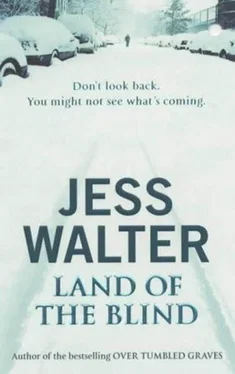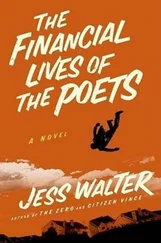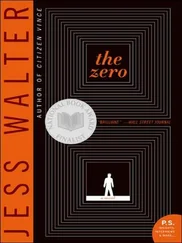Jess Walter - Land Of The Blind
Здесь есть возможность читать онлайн «Jess Walter - Land Of The Blind» весь текст электронной книги совершенно бесплатно (целиком полную версию без сокращений). В некоторых случаях можно слушать аудио, скачать через торрент в формате fb2 и присутствует краткое содержание. Жанр: Детектив, на английском языке. Описание произведения, (предисловие) а так же отзывы посетителей доступны на портале библиотеки ЛибКат.
- Название:Land Of The Blind
- Автор:
- Жанр:
- Год:неизвестен
- ISBN:нет данных
- Рейтинг книги:3 / 5. Голосов: 1
-
Избранное:Добавить в избранное
- Отзывы:
-
Ваша оценка:
- 60
- 1
- 2
- 3
- 4
- 5
Land Of The Blind: краткое содержание, описание и аннотация
Предлагаем к чтению аннотацию, описание, краткое содержание или предисловие (зависит от того, что написал сам автор книги «Land Of The Blind»). Если вы не нашли необходимую информацию о книге — напишите в комментариях, мы постараемся отыскать её.
Land Of The Blind — читать онлайн бесплатно полную книгу (весь текст) целиком
Ниже представлен текст книги, разбитый по страницам. Система сохранения места последней прочитанной страницы, позволяет с удобством читать онлайн бесплатно книгу «Land Of The Blind», без необходимости каждый раз заново искать на чём Вы остановились. Поставьте закладку, и сможете в любой момент перейти на страницу, на которой закончили чтение.
Интервал:
Закладка:
I looked into the lounge. "I don't know if he'd want to see me," I said.
"Yeah," Louis agreed. "He doesn't let go of things easily."
I was surprised that Louis knew about the rift between Eli and me. "Maybe I'll stop by next time I'm in town."
I could see Louis was relieved. "Sure," he said. "Next time."
The waitress saw Louis then and brought him a Coke. "Hey, big guy," she said.
"Hey, toots," he said, and turned away from me. "What time you get off?"
"Couple minutes after you touch me," the waitress said.
This tickled Louis. "On my worst day," he said. While he flirted I tried to get a look at the folder he was carrying, but he held it close to his side. There were about ten other people in the lounge now, and I could see Louis was eager to join them.
"Could you do me a favor and not say anything to Eli?"
"Sure," he said. "It was really great to see you, Clark."
Once Louis was inside, the waitress carried a tray of glasses and two pitchers of soda into the room. Eli held up a pocket watch, made some announcement, and the lounge erupted in noise and activity, like a small stock exchange. Ben and I craned our necks to watch. The group was spread out at the tables, shuffling paper, stacking things, and exchanging what looked like Monopoly money back and forth, making trades, shuffling fake money and papers from their folders back and forth across the tables. People were relaxed and smiling, but they were also working hard. At the front of the room Eli was not smiling. He paced and collected paper from people, handed paper around, talked and gestured with his hands. Every few minutes, he'd turn around and move pins on a big map behind him.
"This gives me the creeps," Ben whispered.
Eli worked with such energy it was hard to take your eyes off him. At one point he wiped sweat from his brow. A few minutes later he castigated one of the girls about something, and she looked down at her shoes in shame.
We watched for ten or fifteen minutes more and then we paid for our soups – Ben hadn't touched his – and walked out, taking the opportunity to look closely into the lounge. At the door, we could hear people yelling: "Two over here!" "Calling out!"
We started walking back toward Ben's apartment. "That was weird," Ben said. "Watching someone who didn't know we were watching him."
I knew what he meant. There was something odd about Eli, the way he could detach from himself physically. "He's always been like that," I said. "I think there's always been this gap between the way he sees himself and the way we see him."
"So which one is real?" Ben asked.
"What do you mean?"
For the first time that day, Ben was engaged. "I just wonder, which is a truer view of reality, the way we see ourselves or the way others see us. Is Eli king of that room, king of the fat girls and albinos? Or is he what we see – the same old awkward guy from our neighborhood, whose only claim to fame is that he once kicked your ass?"
"Eli is what he is."
"But I'm not just talking about Eli." Ben stopped walking and leaned against the chain-link fence of a park. Behind him, kids were shooting baskets on hoops with no nets. "I'm talking about all of us – about me," Ben said. "I imagine I'm living an ascetic's life, stripping myself of everything but my curiosity. But you show up out of the blue and all you see is a guy wasting his life drinking wine and watching TV."
Ben rubbed his hollow cheek and seemed to be chasing something around in his mind. "Or you, with your frat-boy friends and your law school haircut imagining you're more evolved than the rest of us."
I didn't deny it. "So what do you see?" I asked.
Ben's eyes hitched once on the way from my face to the ground. "That's not the point I'm trying to make."
"Sure it is," I said. "What do you see when you look at me?"
"It's not important," he said.
"Come on," I said. "What do you see, Mr. Ascetic? Mr. Chianti. Mr. Curiosity."
"Well," he said. "Okay. I see someone so focused on the way he's perceived that he forgets who he is. And where he's from."
I grabbed him by the sweatshirts and pushed him against the fence. "I'm only going to tell you this once," I said. "Eli Boyle did not kick my ass."
I smiled, and then he did, and I let him go. But for a few minutes afterward I still felt his louvered ribs in my hands, and the echo of what he'd said in my head. We walked slowly back to his apartment, the wind swirling garbage before us, our progress marked by the sagging clapboards of our hometown. I looked around Ben's neighborhood. Every other car window seemed to be covered with plastic or cardboard or duct tape. "Is there no glass in this town?" I asked. We passed a couple of children playing in a patch of dirt that passed for lawn. One of the kids sat in a bathtub, weeds coming through the drain, while the other kid made thundering swats against the bathtub with a stick.
Ben sighed. "You make the classic elitist mistake."
"What's that?"
"Believing that people choose to be poor."
I looked around at the neighborhood, which was not much different from the one Ben and I had grown up in. For the first time it occurred to me that no matter how many times I sat at an outdoor cafe on Capitol Hill, how many beers I had in Pioneer Square, Seattle might never be my home. If that is true – and I have come to believe that it is – then I suppose it's also true that no matter how many interesting and progressive and attractive people I met in my life, I was always alone in some fundamental way when I wasn't in the company of my little brother.
"You'd better get back," said Ben when we reached his apartment.
"Yeah," I said, distracted. "I got this thing tomorrow."
"Sure," he said.
"We okay?"
"Sure."
"And you'll at least think about school?" I asked.
"Every day," he said.
We hugged awkwardly and I started for my car. I thought of something I wanted to say – that he was wrong, that I could tell the difference between what other people thought about me and what I knew about myself – but when I turned around Ben had disappeared, gone back into his cave.
3
My brother died suddenly, or so it seemed to me, embedded as I was in the ephemera of fraternity politics, classwork, and stretch-panted sorority girls that constituted the fall quarter of my junior year. My brother died on November 19, 1985, one month after I saw him, in the hour it took me to finish an exam in Principles of Government – an hour that he spent slipping in and out of consciousness, lifting his head, swearing at a nurse, pulling his IV tubes out, asking for our father, breathing fitfully for a few minutes, and finally going still. My brother died in spite of the fervor of a team of nurses and doctors who arrived with a crash cart and tried shocking and drugging and beating him back to life. My brother died two hours after his first treatment of experimental chemotherapy drugs and high-dose radiation – a double double, one of the techs called it – sparking in my family a perpetual distrust of the medical community, as if the doctors had hastened his death. (Years later, my father still referred to doctors by his clever pet name being diagnosed with Stage IV extradonal Hodgkin's lymphoma – the fastest "outcome" his doctor had ever witnessed for that particular late-stage illness, or so he would tell us later. My brother died a week after turning nineteen.
You might wonder, Caroline, why I've waited until this late point in the narrative to mention something as important as my brother's cancer, why I would attempt to understate it this way, to slip it into the text like any other detail in here, as if an element like that has the same atomic weight as a first kiss, a driver's license, the joys of college. My only defense is chronology, which we cling to the way we cling to faith, in the vain belief that if we obey the order of things, the universe might not go to shit, time might not pile up around us and we might not become buried by random events, ruined by confusion and grief.
Читать дальшеИнтервал:
Закладка:
Похожие книги на «Land Of The Blind»
Представляем Вашему вниманию похожие книги на «Land Of The Blind» списком для выбора. Мы отобрали схожую по названию и смыслу литературу в надежде предоставить читателям больше вариантов отыскать новые, интересные, ещё непрочитанные произведения.
Обсуждение, отзывы о книге «Land Of The Blind» и просто собственные мнения читателей. Оставьте ваши комментарии, напишите, что Вы думаете о произведении, его смысле или главных героях. Укажите что конкретно понравилось, а что нет, и почему Вы так считаете.











